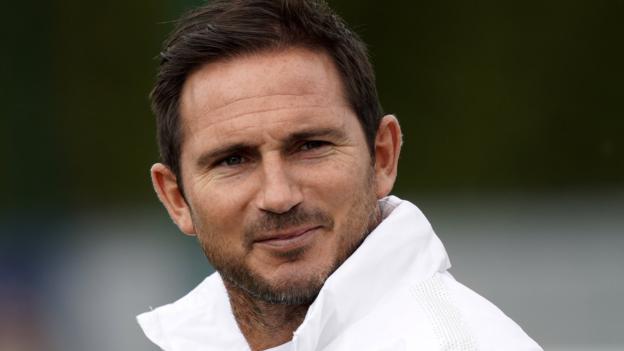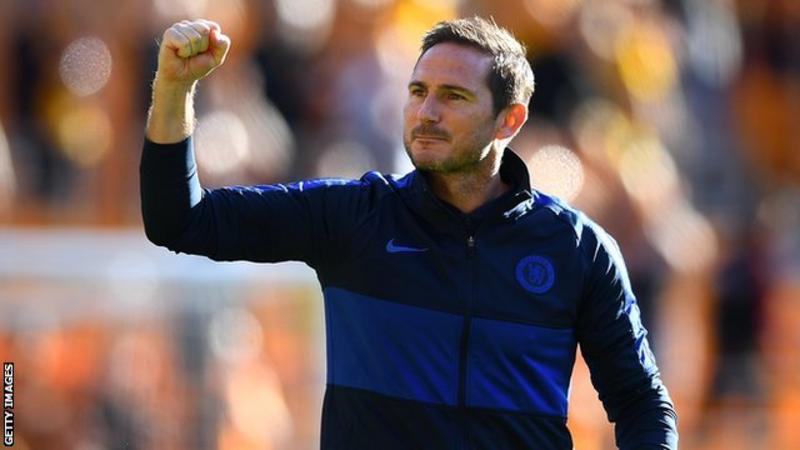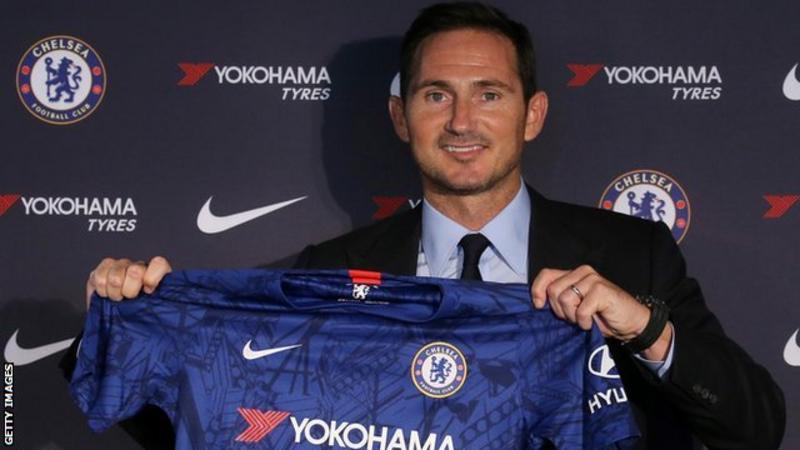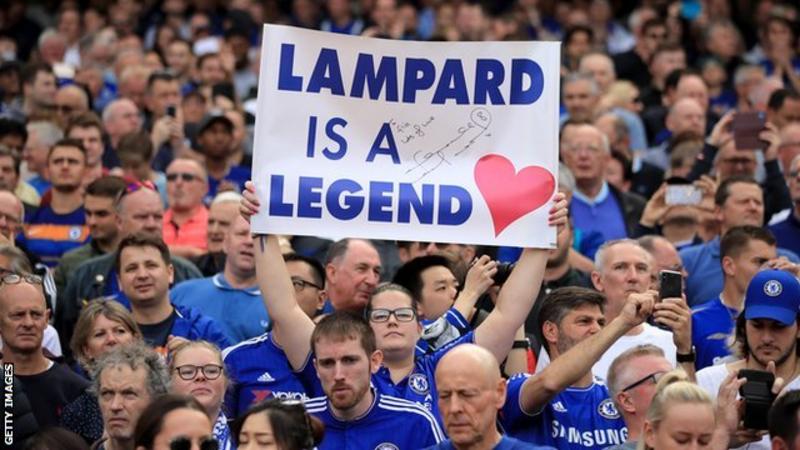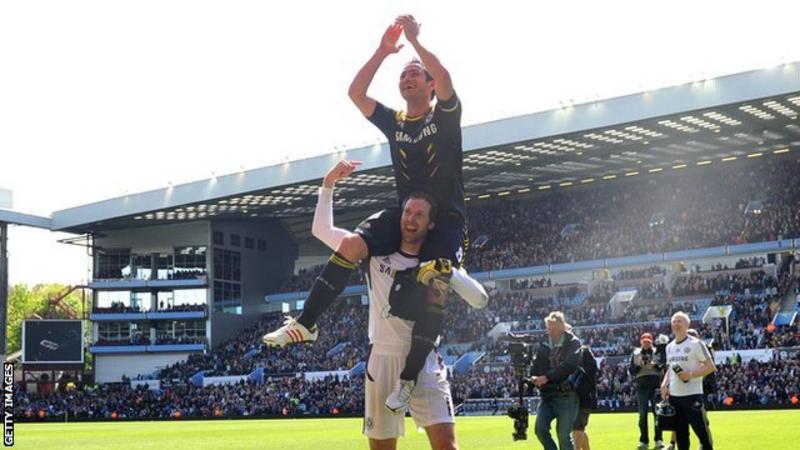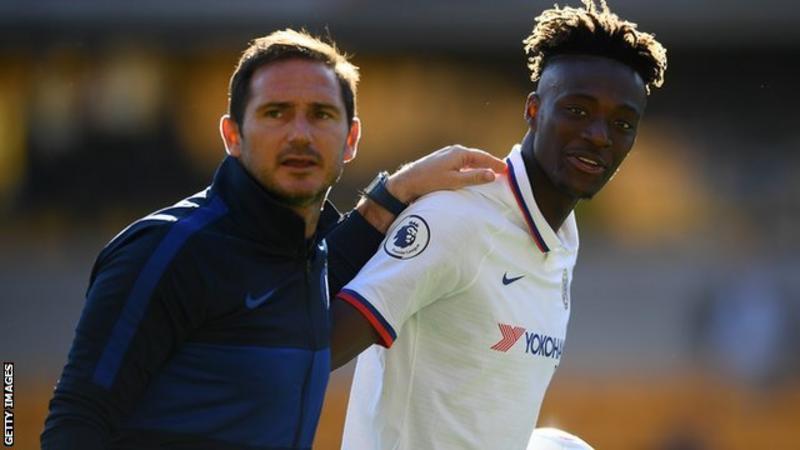Chelsea’s start to life under Frank Lampard has reflected the transitional nature of a club operating under a new template with an inexperienced manager, an influx of young players and a transfer ban.
Lampard has had mixed fortunes, combining impressive away wins at Norwich and Wolves with struggles at home, including a damaging defeat by Valencia in their opening Champions League game on Tuesday.
As the Blues prepare for Sunday’s Premier League home fixture against leaders Liverpool, who have a 100% record, what are the club’s targets in this unfamiliar territory and how are they reshaping under club legend Lampard?
What are Chelsea’s expectations?
Chelsea’s managers are always given the same brief – get towards the end of the season in contention for the major trophies and the Champions League places.
And this year, irrespective of Lampard’s relative inexperience and a transition accelerated by the transfer ban, this will be the aim again.
Chelsea may be in transition but owner Roman Abramovich is not lowering his sights. In financial terms, the club cannot afford to.
The difference between Champions League and Europa League football is about £60m at the bottom line, doubly important for a club whose Stamford Bridge capacity of 41,000 and its resultant revenue is outstripped by attendances at each of the other ‘big six’ clubs – Manchester United, Arsenal, Tottenham, Manchester City and Liverpool, as well as West Ham and Newcastle.
Lampard knows the demands and embraces them. Abramovich is desperate for him to succeed but will not be over-sentimental.
He is the 13th manager Abramovich has appointed since he bought Chelsea in July 2003, with reigns lasting from 1,205 days for Jose Mourinho’s first spell to 223 for Luiz Felipe Scolari in 2008.
There is an understanding among the club and its supporters that this is currently a different type of Chelsea and the level of goodwill and patience Lampard is being given was exemplified by the relatively warm reception they received from the home fans after losing to Valencia.
Former Chelsea winger Pat Nevin believes the club and supporters realise the parameters have changed.
“I do think it will be different this season and the club and the fans will understand that,” he said.
“They have lost their best player in Eden Hazard, they are not able to buy anyone else, they have a lot of young players, a young new manager and on top of all of that they want to change the style of play completely – five things that are radical and not all necessarily helpful.
“Frank will get far more leash – 100%. There is an acceptance and understanding of that. Walking out of the game on Tuesday, having lost at home in the Champions League, people were shrugging their shoulders and the reception was warm.”
This is Chelsea and for all the talk of understanding and patience, ambition is as high as ever.
Lampard knew it as a player and does as a manager.
Why Abramovich backs Lampard to succeed
Chelsea recognised that appointing 41-year-old Lampard – after only one season in management which ended in a Championship play-off final defeat for Derby – carried some risk.
This was, of course, a club that had a supposedly “disappointing” season under Maurizio Sarri that ended with a return to the Champions League, a Europa League triumph and an appearance in the Carabao Cup final.
It was, however, a loveless arrangement on both sides, and part of the point of Lampard’s return is forging a reconnection between club and supporters.
Owner Abramovich felt this was a bold choice that could reap rewards. It was an appointment arguably made earlier than was ideal but he still felt the time was right.
And in coming to his decision, Abramovich called on memories of what he witnessed from Lampard in his playing years at Chelsea, where he won 11 major trophies in 13 years and was the club’s record goalscorer with 211 goals.
It was all part of the equation as Abramovich considered Chelsea’s future.
He remembered the personality who never gave him any cause to doubt his commitment to Chelsea, whose relentless work ethic was exemplary. The Russian expected Lampard to lead in the strongest of dressing rooms and witnessed him do exactly that for years.
It is a stretch to suggest Lampard forged a close personal relationship with the Russian as a player but he was seen as an outstanding influence, someone Chelsea’s owner could lean on and someone who demonstrated rich promise as a coach and wore the burden of management comfortably at Derby.
This all made him Abramovich’s man.
Bumps in the road are expected, as against Valencia, but Abramovich and his key decision-making colleagues, such as director Marina Granovskaia, are working with renewed commitment to make this appointment work.
The word is that in every department at Chelsea, there is a reinvigorated atmosphere because there is so much desire to see Lampard succeed.
Lampard is in daily contact with Granovskaia, as well as Petr Cech after his appointment as technical and performance advisor, and all the noises coming out of Stamford Bridge tell of a renewed sense of purpose.
Lampard’s high-intensity gameplan
Lampard’s mantra for his new Chelsea is high-intensity football – and those who have witnessed the sessions put on at the club’s Cobham training base confirm this is reflected on a daily basis.
Gone are the days under his Italian predecessors Antonio Conte and Sarri when defenders would be hanging on to mannequins on the training pitch waiting for strikers to finish 10-minute drills before being brought in for their work.
Chelsea’s players have found the work fast-paced and energetic, with only very short breaks between drills, before moving on to the next aspect of the session. Some observers liken it to a HIT (high-intensity training) workout.
And while Lampard is hands-on in dictating what will be done, the players are passed through his coaching staff in turn, working with Jody Morris, Chris Jones, Joe Edwards and Eddie Newton, all under the manager’s supervision.
The laughter is also said to have returned to Cobham, but at the heart of it all is very serious business as Chelsea’s players are shifted around quickly from function to function to achieve the tempo Lampard will be demanding to match Liverpool’s pressing style on Sunday.
- Chelsea boss has ‘one hell of a job on’ – Chris Sutton
- Frank Lampard demands social media firms crack down on abuse of players
And the team’s playing style this season reflects those changes on the training field.
‘Sarriball’ – with its focus on ball retention and long passages of build-up play – was never fully embraced at Stamford Bridge and Lampard has wasted no time in moving away from it.
Chelsea are not passing the ball anywhere near as much – they average 101 fewer passes per game this season than last. As well as playing fewer passes overall, their share of possession in games has dropped from 63.4% under Sarri to 55.2% under Lampard.
There are also far fewer long sequences of possession. Under Sarri, they averaged 19.3 instances of 10 or more passes in a game. This season that has dropped to 14.6 – a 24% decrease and a clear sign that Lampard has asked them to be more direct, utilising the qualities of his new-look starting XI.
In other words, there is no keeping the ball for the sake of it – an accusation sometimes levelled at them during Sarri’s tenure.
Cech strengthens Chelsea reconnection
Lampard was not the only legendary Chelsea former player to return to Stamford Bridge this summer, with Cech appointed as technical and performance advisor.
The Czech goalkeeper, who won 13 trophies – including four Premier League titles and the Champions League – in his 11-year Chelsea career, arrived before Lampard but is another key figure in the club’s restructure.
He is a sounding board and also a bridge to the Chelsea hierarchy.
This, coupled with the return of Morris and Jones after they joined Lampard at Derby, is adding to the feeling of reconnection between Chelsea and their supporters after the discontent of the latter days under Sarri.
Chelsea were appreciative of Sarri’s work in guiding them back into the Champions League and winning the Europa League – but it did not go unnoticed by those in high places that there was a lack of rapport with supporters and that did not help the atmosphere.
Even Sarri’s idiosyncrasies, such as his deep superstitions about not walking on to the pitch or touching the grass, added to the sense of distance. There was a feeling he was not interested in promoting himself or the club, or bonding with supporters.
It was a sharp contrast to the emotional and demonstrative Conte, who once threw himself into the crowd at Stamford Bridge to celebrate a goal.
There is a strong link between Lampard and the fans – but also between the manager, Cech and Granovskaia.
Cech is closely connected to the first team and Lampard but also has responsibilities for Chelsea’s loan department and scouting. He is at Cobham virtually every day, as well as being a visible presence at matches.
The 37-year-old, regarded as a gregarious and intellectual figure around Chelsea as well as someone with a track record of success, may broaden his role in future but for now his task is to bring together the different departments that make the first team tick, reporting in to the influential Granovskaia, the close confidante of owner Abramovich.
Morris’ return brings another successful old boy back into the fold as the club look to benefit from the natural fit and friendship with Lampard.
He was a key figure behind the scenes as Chelsea’s youth team won the FA Youth Cup six times in seven seasons between 2012 and 2018 but the coaching bond with Lampard was forged when the latter was doing his coaching badges and worked alongside Morris with the under-18s.
Morris is also closely linked to those emerging youngsters Mason Mount, Fikayo Tomori and Tammy Abraham, who figured in those successes.
Lampard trusts in youth
Chelsea’s hand has been forced, to an extent, by a Fifa-imposed transfer ban until the end of January 2020, enforced after an investigation into their signing of foreign under-18 players.
It has pushed forward the development of Abraham, Mount and Tomori, who have split Chelsea’s 11 Premier League goals this season between them.
Abraham found it a struggle during a loan spell in the Premier League with Swansea in 2017-18, scoring only five goals in 31 games, but he was the key man in Aston Villa’s promotion to the Premier League with 26 goals in 40 games last season.
Mount and Tomori were instrumental in Derby reaching the Championship play-off final under Lampard, meaning he has had no hesitation in playing them in the top flight this term.
It is almost certain they will be joined by 18-year-old Callum Hudson-Odoi and Ruben Loftus-Cheek, still only 23, once they recover from injury. Reece James, the 19-year-old defender, is another rich prospect.
Their emergence is the result of a deliberate change in Chelsea’s targeting and scouting strategy at this level over the past seven years, aiming to recruit the cream of young British talent rather than focusing on Europe and elsewhere.
And in Lampard, with his own stellar career, they believe they have the perfect mentor who trusts their talent.
Loftus-Cheek signed a new long-term deal in the summer and Hudson-Odoi, who was courted by Bayern Munich last season, has put previous discontent about future opportunities behind him, agreeing a new five-year contract understood to be worth more than £120,000 a week.
Expectations remain high and there may be turbulence – but Chelsea still regard themselves among the elite under Lampard.
Source: Read Full Article
